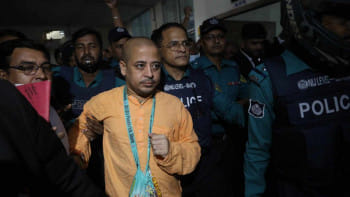Why India cannot afford to undermine Bangladesh

While India's role in Bangladesh's 1971 Liberation War is noteworthy, it is equally important to acknowledge Bangladesh's contributions to the making of modern India, as their historical significance extends long before independence. The Bengal region, encompassing both Bangladesh and eastern India, was a vibrant hub of intellectual, artistic, spiritual, political and economic activities during British colonial rule. It was here that many of British India's most significant independence movements took root, from the literary works of Rabindranath Tagore and Nazrul Islam to the revolutionary undertakings of Surya Sen, Shariatullah and Titumir, as well as the political leadership of Sher-e-Bangla, Bhashani and Suhrawardy, all of which played a crucial role in shaping the sociopolitical landscape. Today, Bangladesh continues this legacy by contributing to regional stability, playing a crucial role as a geo-strategic buffer, which in turn protects India's own security and development.
The Bangladesh-India relationship is shaped by a complex blend of geopolitical, historical and sociocultural factors. However, in recent times, it increasingly feels like a tense battleground. With Bangladesh sharing a direct border with India's strategically crucial Chicken's Neck, any instability within Bangladesh could ripple across the region, destabilising India including its northeastern Seven Sisters states, thus exacerbating the current tensions. The two countries share a sprawling 4,096 km border, the fifth longest in the world, and not all of it has yet been fully demarcated. So, the countries should ideally be partners in growth and development. Yet, this potential remains largely unrealised, with the relationship taking an ironic turn nowadays. Rather than fostering trust and mutual prosperity, India's often domineering approach and ongoing grievances have deeply strained this partnership.
While many might assume that Bangladesh, as the smaller nation, stands to lose more from this discord, the reality is quite the opposite. If Bangladesh succeeds in reducing its reliance on India, it could emerge as a powerful regional player in the Global South, while India risks losing significant economic and geopolitical opportunities. Bangladesh's rapid rise is one of the most compelling development stories of the 21st century. It surpassed India in GDP per capita some time ago and also outpaced it in key human development indicators, including life expectancy, gender equality, and poverty reduction, with notable achievements in women's empowerment and microfinance serving as global models of development.
This shift towards greater self-reliance is not unprecedented, and our subcontinent's history offers important lessons on how trade restrictions can often backfire, leading affected countries to bolster their domestic capacities. A notable example is India's own response to military supply challenges during the Sino-Indian conflict of 1962, which spurred the development of its domestic defence industry. Similarly, India's ban on cattle exports to Bangladesh played a pivotal role in helping Bangladesh achieve self-sufficiency in this area, as local farmers and traders turned to cattle rearing, drastically reducing the country's reliance on imported animals. Today, Bangladesh is nearly fully self-reliant in meeting its cattle demand, even during the Eid-ul-Azha festival, which includes cattle sacrifice and the distribution of the meat among the poor nationwide. Likewise, recurring challenges in sourcing essential commodities like onions, potatoes, and garlic from India signal that Bangladesh is likely to continue boosting its domestic production, further strengthening its economic resilience.
This trend extends to the healthcare sector as well, where there are newfound tensions surrounding the rejection of Bangladeshi patients and surgery refusals by Indian hospitals, which not only breach the Hippocratic Oath—the ethical pledge taken by physicians, including those in India—but also risk backfiring. Such actions could prompt Bangladesh to further invest in and strengthen its own healthcare infrastructure. Moreover, this has already contributed to an increasing number of Bangladeshi patients seeking treatment in Malaysia rather than India. These challenges may ultimately drive Bangladesh towards greater self-sufficiency, fostering long-term growth in critical sectors, including RMG, where it can reduce dependency on India for raw materials like cotton and energy. This could also encourage new partnerships in non-traditional markets.
India's behaviour towards Bangladesh becomes even more perplexing when compared to the dynamics of other successful neighbourly relationships. For example, the United States and Canada have built a partnership based on mutual respect, balanced trade, and shared goals. Despite being the larger power, the US recognises Canada's strategic importance and treats it as an equal. Similarly, Australia and New Zealand share a relationship defined by economic integration and cultural camaraderie. In contrast, India has treated Bangladesh more like an afterthought, undermining what could have been a mutually beneficial relationship by treating Bangladesh as a partner in South Asia's shared future. Water-sharing, particularly from the Teesta River, highlights India's short-sightedness. While Bangladesh depends on the river for agriculture, India's unilateral control has endangered millions of livelihoods in the northern part of the country.
India's reluctance to open its markets to Bangladeshi products reflects a patronising attitude, assuming that Bangladesh will always remain dependent. Yet, this dependency is steadily eroding. Bangladesh is actively diversifying its trade partnerships, and strengthening ties with China, the European Union, and Southeast Asia. While Dhaka maintains cordial relations with both the US and China, balancing these alliances becomes increasingly complex as global rivalries escalate. Rather than acting as a bridge to these blocs, India is increasingly behaving like a gatekeeper. If India continues on this path, it risks finding itself surrounded by neighbours—Bangladesh, Nepal, Sri Lanka, Pakistan, the Maldives, and Myanmar—more aligned with others than with New Delhi. The irony is striking: in its attempt to assert dominance over Bangladesh, India may have inadvertently accelerated its own marginalisation, sidelining itself in its own backyard.
Bangladesh's rising stature on the global stage is earning respect and influence in international forums. Twenty-eight European Union (EU) envoys altogether are set to meet Chief Adviser Prof Muhammad Yunus for the first time ever to reaffirm the EU's support and commitment to high-level cooperation. Of the 28 EU diplomats, 20 are coming from New Delhi. This diplomatic move highlights Dhaka's growing importance in global affairs. As the world increasingly recognises Bangladesh's potential, India risks being viewed as a nation that is unable to foster positive relationships with its neighbours, even failing to honour the Vienna Convention by its inability to safeguard a neighbouring country's diplomatic mission. This could undermine India's aspirations for a greater role in global governance, including its bid for a permanent seat on the UN Security Council.
The tale of two neighbours does not necessarily have to be a tragedy. Bangladesh and India stand at a crossroads; let us hope they choose the path of cooperation, not conflict.
Dr Iftekhar Ul Karim is assistant professor at BRAC Business School, BRAC University. He can be reached at [email protected].
Views expressed in this article are the author's own.
Follow The Daily Star Opinion on Facebook for the latest opinions, commentaries and analyses by experts and professionals. To contribute your article or letter to The Daily Star Opinion, see our guidelines for submission.


 For all latest news, follow The Daily Star's Google News channel.
For all latest news, follow The Daily Star's Google News channel. 











Comments